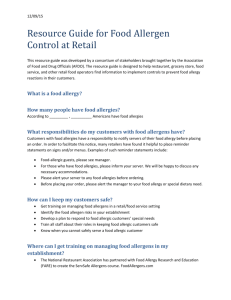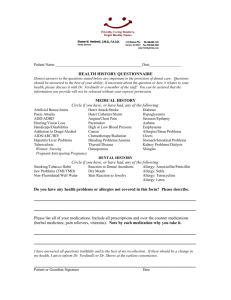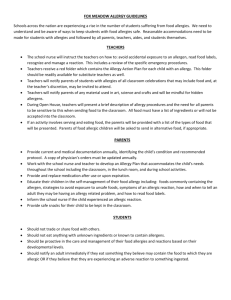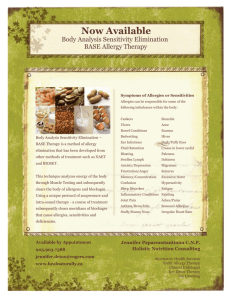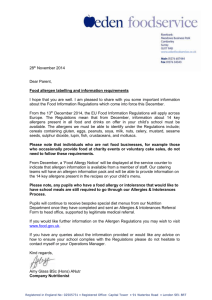Reducing the Risk of Exposure to Food Allergens
advertisement
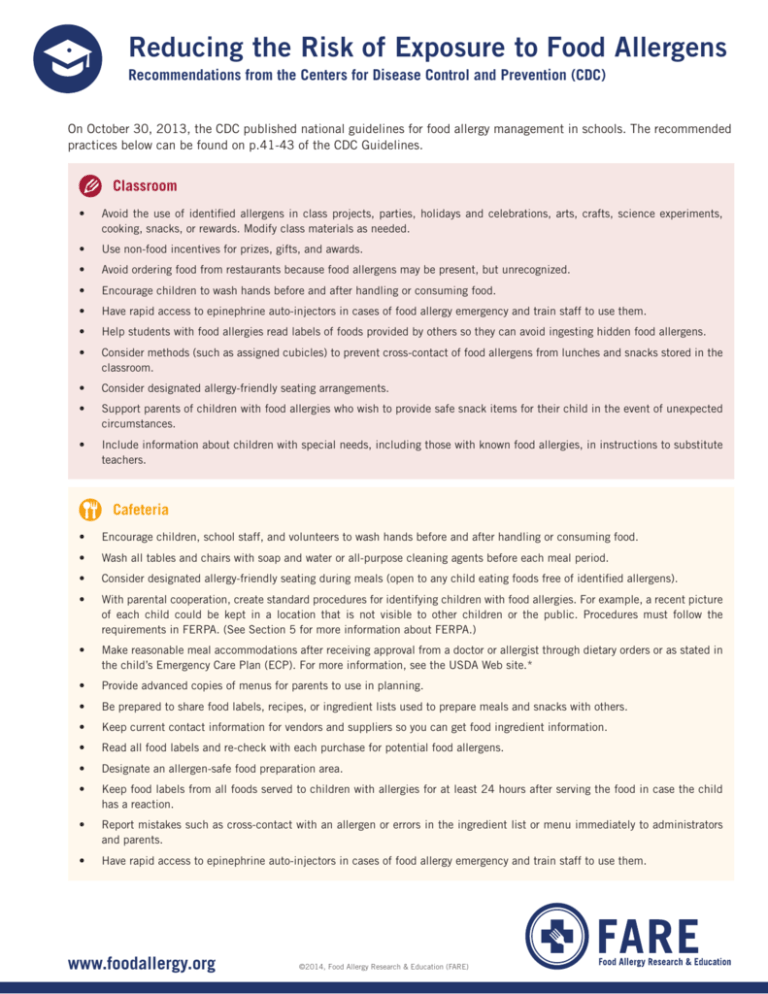
Reducing the Risk of Exposure to Food Allergens Recommendations from the Centers for Disease Control and Prevention (CDC) On October 30, 2013, the CDC published national guidelines for food allergy management in schools. The recommended practices below can be found on p.41-43 of the CDC Guidelines. Classroom • Avoid the use of identified allergens in class projects, parties, holidays and celebrations, arts, crafts, science experiments, cooking, snacks, or rewards. Modify class materials as needed. • Use non-food incentives for prizes, gifts, and awards. • Avoid ordering food from restaurants because food allergens may be present, but unrecognized. • Encourage children to wash hands before and after handling or consuming food. • Have rapid access to epinephrine auto-injectors in cases of food allergy emergency and train staff to use them. • Help students with food allergies read labels of foods provided by others so they can avoid ingesting hidden food allergens. • Consider methods (such as assigned cubicles) to prevent cross-contact of food allergens from lunches and snacks stored in the classroom. • Consider designated allergy-friendly seating arrangements. • Support parents of children with food allergies who wish to provide safe snack items for their child in the event of unexpected circumstances. • Include information about children with special needs, including those with known food allergies, in instructions to substitute teachers. Cafeteria • Encourage children, school staff, and volunteers to wash hands before and after handling or consuming food. • Wash all tables and chairs with soap and water or all-purpose cleaning agents before each meal period. • Consider designated allergy-friendly seating during meals (open to any child eating foods free of identified allergens). • With parental cooperation, create standard procedures for identifying children with food allergies. For example, a recent picture of each child could be kept in a location that is not visible to other children or the public. Procedures must follow the requirements in FERPA. (See Section 5 for more information about FERPA.) • Make reasonable meal accommodations after receiving approval from a doctor or allergist through dietary orders or as stated in the child’s Emergency Care Plan (ECP). For more information, see the USDA Web site.* • Provide advanced copies of menus for parents to use in planning. • Be prepared to share food labels, recipes, or ingredient lists used to prepare meals and snacks with others. • Keep current contact information for vendors and suppliers so you can get food ingredient information. • Read all food labels and re-check with each purchase for potential food allergens. • Designate an allergen-safe food preparation area. • Keep food labels from all foods served to children with allergies for at least 24 hours after serving the food in case the child has a reaction. • Report mistakes such as cross-contact with an allergen or errors in the ingredient list or menu immediately to administrators and parents. • Have rapid access to epinephrine auto-injectors in cases of food allergy emergency and train staff to use them. www.foodallergy.org ©2014, Food Allergy Research & Education (FARE) Reducing the Risk of Exposure to Food Allergens Transportation • Train transportation staff in how to respond to food allergy emergencies. • Have rapid access to epinephrine auto-injectors in cases of food allergy emergency and train staff to use them. • Encourage children to wash hands before and after handling or consuming food. • Do not allow food to be eaten on buses except by children with special needs such as those with diabetes. School or ECE Program Events (Field Trips, Activities Before or After School) • Do not exclude children with food allergies from field trips, events, or extra-curricular activities. • When planning a field trip, find out if the location is safe for children with food allergies. • Identify special needs before field trips or events. • Invite, but do not require, parents of children with food allergies to accompany their child in addition to the regular chaperons. • Make sure that events and field trips are consistent with food allergy policies. • Package meals and snacks appropriately to prevent cross-contact. • Encourage children to wash hands before and after handling or consuming food. • Have rapid access to epinephrine auto-injectors in cases of food allergy emergency and train staff to use them. Physical Education and Recess • Do not exclude children with food allergies from physical education or recess activities. • Encourage hand washing before and after handling or consuming food. • Have rapid access to epinephrine auto-injectors in cases of food allergy emergency and train staff to use them. We encourage you to learn more about food allergy management in schools by reviewing the entire CDC Guidelines document at: www.foodalleryg.org/cdc. www.foodallergy.org ©2014, Food Allergy Research & Education (FARE)
